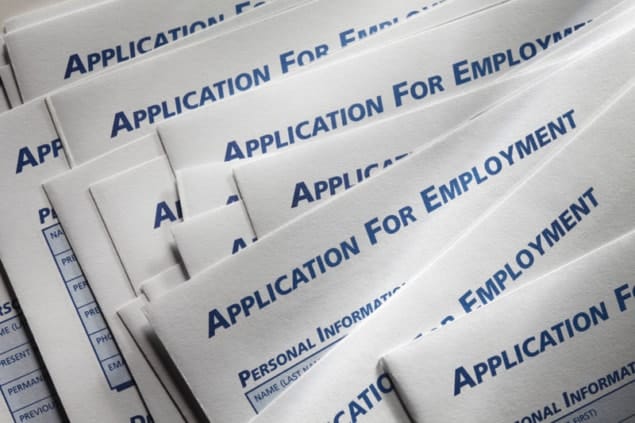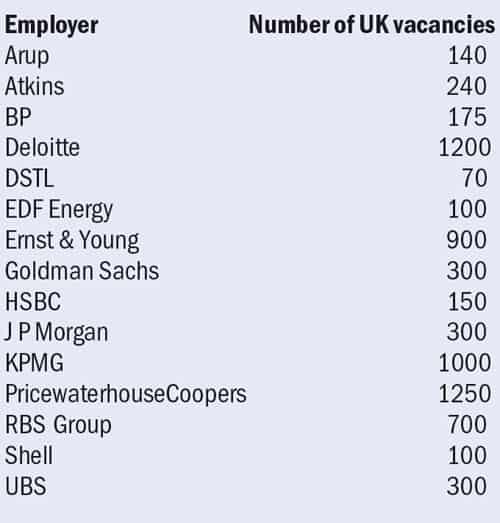With graduation looming, it is time to think about what comes next. Simon Perks examines how physicists can make themselves stand out in a competitive graduate job market

If you have read a newspaper, listened to the radio or browsed the Internet in the last 12 months, you could be forgiven for thinking that the outlook for new graduates is bleak. Graduate numbers are up, employment figures are down and business confidence is teetering on the edge. But are things really that desperate? For this special graduate section, Physics World set out to discover who is hiring physics graduates – and how you can get your application to the top of the pile.
The good news is that the job market for new graduates is looking up. “Things have never been as bad as the headlines might suggest,” says Don Murray, a careers adviser at the University of Edinburgh. “From a low point in 2008, we’ve seen a steady rise in vacancies year on year.” Brian Staines, head of guidance at the University of Bristol careers service, agrees. “The situation for graduates is improving gently,” he explains. “Things have definitely picked up.”
The message from employers is similarly positive. Data from High Fliers Research, the specialist graduate-recruitment market-research company, show that the UK’s leading employers expect to increase their graduate intakes by an average of 6.4% in 2012 compared with 2011. In some sectors, the picture is even more encouraging. Vacancies in engineering and industrial companies are up by 22%; in banking and finance, they are up by 16%. This will be promising news for many physics graduates, says Murray, noting that the top three destinations for Edinburgh’s physicists are engineering, finance and information technology. Data from other universities tell a similar story (see “What physics graduates do: 2006–2010”).
For graduates who want to pursue their interest in science, a range of opportunities are available in energy companies, engineering firms and the research divisions of larger manufacturers. And despite planned cutbacks in government spending, physics graduates should not necessarily overlook the public sector. Recruiters such as the Met Office and the Defence Science and Technology Laboratory are keen to attract high-quality science graduates.
Despite a post-credit-crunch dip in the numbers of graduates entering banking and finance, businesses in this sector remain eager to draw on the numerical skills and problem-solving ability that science graduates can bring. “We are proactively trying to attract people from outside finance and economics, as well as those with financial backgrounds,” says Sarah Harper, head of recruiting for Europe, Middle East and Africa at the investment bank Goldman Sachs. She adds that the firm recently held a careers event aimed specifically at students of STEM (science, technology, engineering and maths) subjects.
The not-so-good news, according to High Fliers Research, is that graduate recruitment is still 6% down on its high point in 2007, and with 50 000 more graduates taking the first step onto the career ladder than five years ago, competition for jobs is fierce. Last year, recruiters from the large, high-profile firms covered by High Fliers Research received an average of 48 applications for each graduate place, and that figure is likely to be even higher in 2012. In such a crowded market, even graduates in the sought-after discipline of physics are going to have to really stand out if they are to find – and secure – their dream job.
Quality, not quantity
Graduates who are trying to boost their applications from “good” to “great” will be pleased to know that many of them will already be more than halfway there, thanks to their educational experience. “We recognize that applicants have already been tested numerous times in their journey through the education system,” says Robin Harbach, head of human resources at the Met Office, adding that those who have an upper second from a good university are “already 70% of the way through the selection process”. The key to the remaining 30%, he explains, is more about an applicant’s attitude than their aptitude. In other words, they need to convince potential employers that they are the right person for that organization, and for that specific role.
The first step to accomplishing this is to learn everything you can about the company and the role that you are applying for. Look at the organization’s website and read the job description carefully. Visit your university’s careers service to find out what information they have. If the company is holding a recruitment event, go along and hear what it has to say. “We expect applicants to know about our company, who we are and how we are structured,” says Vicki Potter, resourcing manager at Oxford Instruments, which recruits physics graduates to a range of roles. Kate Waterstreet, a graduate recruitment adviser at Atkins, an engineering and design consultancy, agrees. “You can tell when someone has really researched what we do,” she says.
This level of research can take a while, however, and it absolutely should not be left until the train journey to your interview. “It is obvious when someone has only started to read the Financial Times over the last week,” observes Harper, of Goldman Sachs. To help students budget their time, careers officers counsel restraint. “Resist the temptation to bash out 25 mediocre applications,” advises Bristol’s Staines. “Focus on quality, not quantity. Target each application at the specific organization and vacancy.” Recruiters, adds Harper, need to understand why you want to work in their company and what excites you about that role. “We are looking for a personal story about why someone is interested in working at our firm, such as particular deals we have been involved in that have caught their attention or discussions with Goldman Sachs professionals who they have met at recruiting events,” she says. Above all, says the Met Office’s Harbach, applicants should show that they really, really want the job. “If you’re not passionate about what you want to do,” he asks, “how will anyone else get passionate about hiring you?”
Being passionate, though, is no excuse for being sloppy. When preparing your cover letter, CV or application form, you must make sure you proof-read it before you send it off. This really should not need saying, but recruiters can provide story after story of poor spelling and grammar, missing attachments and obvious copy-and-paste errors. A genuine, deep interest in a particular role and a perfect cover letter will get you nowhere if you name-check the wrong company in the opening paragraph. “Get the basics right,” urges Edinburgh’s Murray. “A good, clear application will stand out.”
The importance of soft skills
In addition to spell-checking their applications, physics graduates should also remember that, although physics is a very attractive degree from a technical point of view, employers are looking beyond technical competence. “What you know is half the battle,” says Harbach. “How you do it is the other half. We need to know how well you can relate to people.”
This is where skills such as communication, teamwork and leadership can play a vital role. However, it is not sufficient just to say that you have these skills – you need to prove it. This means providing concrete examples of how you have used these skills and what you have achieved. So if you have been the president of your university’s debating society, worked weekends in a shop or volunteered for a local charity, now would be a good time to mention it. And the more relevant these examples are to the job you are applying for, the better. “Target what the employer wants,” says Murray. “Link your own experience and skills to that vacancy. Show why you would be a good employee.”
Work experience, in particular, can make the crucial difference between a good application and a great one. According to High Fliers Research, recruiters estimate that one-third of this year’s entry-level positions will be filled by graduates who have already worked for their organizations, whether through industrial placements, vacation work or undergraduate sponsorship. For investment banks, this figure rises to three-quarters, and recruiters warn that graduates with no previous work experience are unlikely to be successful. “In a highly competitive graduate job market, new graduates who have not had any work experience at all during their time at university have little hope of landing a well-paid job with a leading employer,” says Martin Birchall, managing director of High Fliers Research. This is true, he adds, “irrespective of the academic results they achieve or the university they have attended”.
“Work experience is a key way of being able to differentiate yourself,” agrees Harper at Goldman Sachs. “[For us], something in an investment bank would be best, even if it is just for a week. But anything where you are challenging yourself is good – something where you are able to demonstrate that you can add value.”
On the upside, many leading employers offer paid work-experience programmes for students and recent graduates. Two-thirds provide industrial placements for six to 12 months and more than half have paid vacation internships for three weeks or longer. And if your employment history so far has been somewhat lower key, then don’t worry. “Any form of work experience is important,” says Waterstreet, of Atkins. Potter, at Oxford Instruments, makes a similar point. “We want people who have experience of dealing with customers,” she explains, “even if that is from working in a shop.”
If all goes well, the next stage is an interview or assessment. Here, as in the application, the key to success is preparation. Most recruiters explain on their website what form the interview or assessment will take and what you can expect on the day. Your careers service can also help you to prepare, by coaching you on interview skills, helping you to anticipate questions and directing you to online tests for a bit of practice. For example, Staines notes that nearly all interviews are “competency based”, which means that the interviewer wants to find out whether you have the specific skills the employer needs. Because of this, he says, a well-prepared student should be able to anticipate 70–80% of the questions, especially “the obvious ones” that ask you to give examples of occasions when you have planned your time effectively, worked in a team or overcome difficulties in completing a task.
Still, you will also need to demonstrate your enthusiasm for the industry, the company and the role. “Just answering the questions well will not get you the job these days,” says Harbach at the Met Office, adding that graduates need to show that they are “keen and driven”. Potter says that she is always impressed when an applicant comes armed with questions about the company’s products and markets; this shows that they are interested and that they have done their research.
As with many things in life, the key to success here is hard work. Put in the time, do the research and find out what the employer is looking for. Then show how your skills, qualifications and experience make you the ideal candidate. It is not easy, but this methodical approach pays dividends. If you make “a real effort” with your application, advises Potter, this will “automatically” put you in the top 10%.
When the right job isn’t there
Sometimes, though, things do not go according to plan. Perhaps you cannot decide what you want to do. Maybe you know what you want but the right vacancy is proving elusive. Or perhaps you have been applying for job after job with no success. The key here is not to panic. You do not have to get into your dream career straight away. Sometimes it takes time to find and secure the job that you want.
One suggestion from Bristol’s Staines is to look beyond well- advertised jobs, and submit speculative applications for hands-on work experience in your chosen sector. Small and medium-sized businesses may have vacancies, he says, but many do not advertise heavily with universities. Staines also counsels approaching potential employers just for advice, rather than with a cover letter and CV. “Don’t start by asking ‘Have you got a job going?’, as they can shut the conversation down with a simple ‘no’,” he says. Instead, just explain your situation and ask for advice. “Most will be more than happy to help – and if they do have any vacancies coming up, they’re likely to let you know, too.” It is also worth remembering that many employers recruit graduates year round, not just immediately after graduation.
For those who need more help, university careers services are a good port of call (see “Seeking advice”). Many services maintain networks of alumni, for example, who may be able to advise you on your application or your career choice. Even if you have already graduated, it is still worth visiting, since most careers services continue to support graduates for two or three years after they have left. If you have moved away, and a visit to your own university is not practical, you may find that your local university is able to step in; nearly all careers services are part of a “mutual aid” network and will be able to advise you as if you were one of their own graduates.
If you find that you need to boost your skills, then it might be worth thinking about postgraduate study. Edinburgh careers adviser Murray urges caution, though. “Postgraduate study is not for everyone,” he explains. “To do it solely as a stop-gap measure is not a good idea. Think carefully about where the course will lead you.” Staines agrees, adding that you should only enter into further research or study “if it is what you want or if it will help you with your job prospects”. “Look at the destinations of people who have completed that course and see what they are doing now,” he adds.
The main thing, says Potter at Oxford Instruments, is to do something with your time while you find the right job. “Find a temporary job,” she suggests. “Show that you are willing to work hard. Travel is fine, too. But demonstrate that you are learning something from it. Do anything. Just don’t do nothing.”






